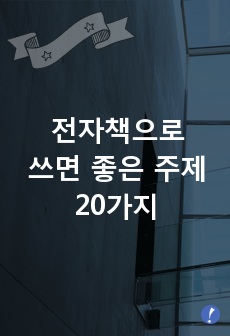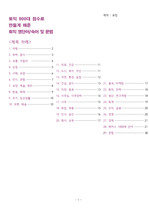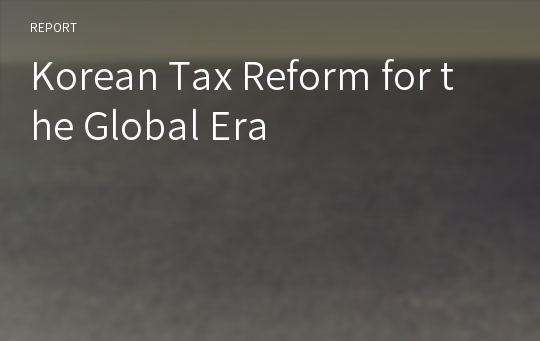Korean Tax Reform for the Global Era
*현*
다운로드
장바구니
소개글
As deregulation and liberalization prevail, financial policy tends to lose its effectiveness. Fiscal policy instead has assumed a greater role.These global changes necessitated world wide tax reforms: countries responded to the new environment either by reducing corporate taxes or by adopting separate taxes on capital income.
East Asian Countries, Korea, China and Japan are geographical neighbors who share some of their common cultural heritages but, at the same time, they differ in many other aspects.
In spite of such differences, these countries are confronted with the same global economic transformation.
목차
I. IntroductionII. Changing Environment and Tax Reform
1. Globalization and Changing Environment
A. Globalization and Tax Competition
B. Evolution into Information Age
C. Increased Demand for Social Welfare
D. Environmental Protection
2. Basic Nature of Tax Reform
A. Tax Reform That Responds to Globalization
B. Comprehensible Taxation
C. Establishment of Green Tax Reform
III. Tax Reform for the Globalization Age
1. Tax Competiton and Broadening Tax Base
A. Adjustment of Deductions & Credits
B. Capital Gains Taxation
C. Taxes on Fringe Benefits
D. Adjustment of Tax Rates and Tax Base Brackets
2. Corporate Taxation in the Global World
A. Corporate Taxation under Tax Competition
B. Corporate Tax Rates
C. Introducing the Consolidated Tax Return System
3. Sound Social Welfare Financing
4. Taxing E-Commerce in the Age of Information
5. Tax Administration in the Global World
A. Increasing the Number of Bookkeepers
B. Enhancing Transparency
C. Realignment of Tax Administration
6. Green Tax Reform and International Cooperation
References
본문내용
1. Globalization and Changing EnvironmentA. Globalization and Tax Competition
As globalization progresses, the international mobility of factors of production, especially capital has been accelerated. Liberalization and deregulation of financial markets that started from 1980s, have facilitated capital movement into the most efficient markets. This led to a further deregulation with a result of free market taking its major role. Government authorities instead assumed the role of making and supervising rules that promote fair competition.
The integration of financial markets has facilitated capital movement across borders, which in turn prompted tax competition. Each country has an incentive to slash capital tax burden to attract foreign capital and to prevent domestic capital flights. In particular, corporation taxes and business income taxes has become major targets of tax competition. The fall in the OECD countries’ average corporation tax rate from 41.6% in 1986 to 30.6% in 2000 illustrates the extent of competition.
Tax competition is also going on with respect to personal income taxation. Especially, within Europe, cross-country movement of labor, particularly high quality labors, is quite frequent. Therefore, the OECD highest marginal tax rates of personal income taxation, on average, have shown a continuous downward trend from 54.6% in 1986 to 39.5% in 2000 as governments tried to stimulate human capital formation and to curb outflow of high quality labors.
참고 자료
American Chamber of Commerce in Korea, Dynamic Korea: Hub of Asia, 2002.An, Chang-Nam, A Research on the Improvement of Value Added Tax, Korea Tax Research Center, 2002.
Barde, Jean-philippe, Nils Axel Braathen, Environmentally Related Levies, Paper prepared for the Conference on Excise Taxation, 11-12 April 2002, The Hague, The Netherlands.
Carmody, Geoff, Fringe Benefits Tax: Time for a Rethink, Australian Tax Research Foundation, 1998.
Choi, Joonook, A Study on Green Tax Reform, KIPF, 2001
Choi, Kwang and Woo-Taek Lee, A Direction of Improvement in Value Added Tax and Tax Policy, Korea Tax Research Center, March 1988.
Choi, Myung-Geun, Theory of Value Added Tax Laws, Young Hwa Press, 2002.
Chun, Young-Jun and Jae-Jin Kim, Improvement of Tax system on Wage and Salary Income Tax, KIPF, September 2001.
Chun, Young-Jun, Chul-In Lee, Beom-Gyo Hong and Jang-Kyu Lee, Improvement of Financial Income Tax: Capital Gains Tax on Security Transaction, KIPF, 2000.
Flip de Kam, Discussion Paper for Conference on Environmental Fiscal Reform, Berlin, 27 June 2002.
Hong, Beom-Gyo and Jongseok An, E-Commerce and Taxation, KIPF, 2001.
International Fiscal Association, The Taxation of Employee Fringe Benefits, 1995.
Kim, Jinsoo, “Introduction of the Japanese Consolidated Tax System and Its Lessons”, Public Finance Forum, KIPF, April 2002.
Kim, Yong-Min, Easy to Understand Income Tax, 2001.
Kim, Yu-Chan, The Range of Exemption Problems and the Direction of






























